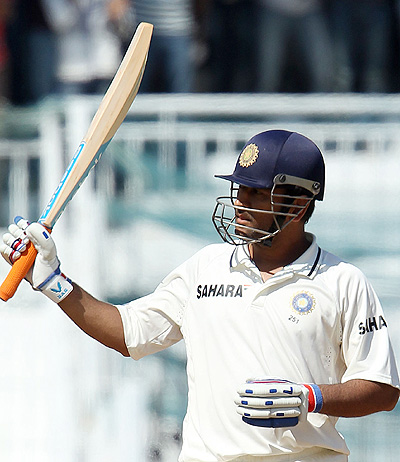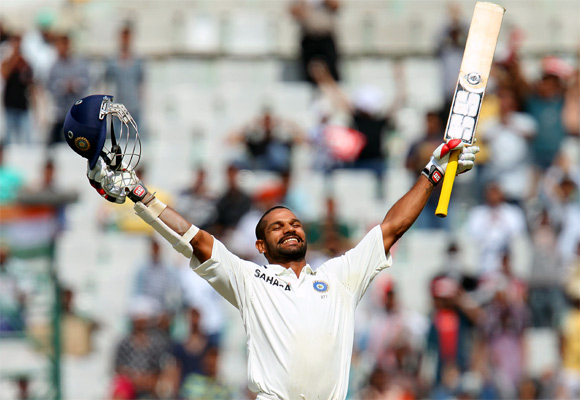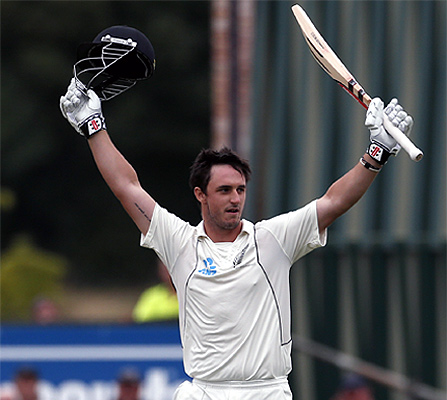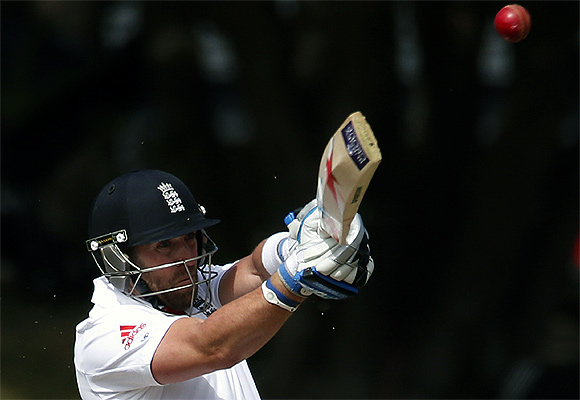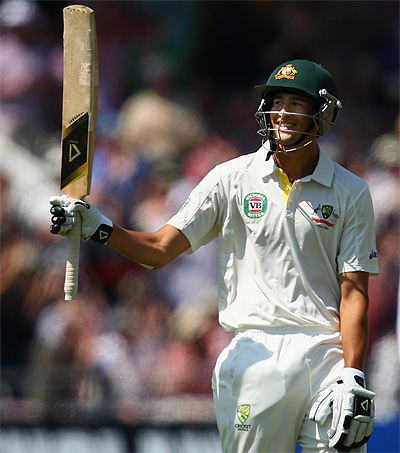 | « Back to article | Print this article |
Dhoni answered his critics in style
Bikash Mohapatra looks at a few innings that redefined Test batting this year, and, in the process, upheld the tradition of the five-day format.
South Africa is unbeaten thus far and very comfortably managed to retain its No.1 status.
India completed a first ever clean sweep (4-0) over Australia and maintained its impressive record at home against the team from Down Under.
And England just retained the Ashes, and will keep the urn for the third straight time.
These are some trends Test cricket has witnessed this year.
And it has seen some defining innings, mostly from unexpected sources.
Check out some of them:
MS Dhoni
224 vs Australia
Leading our list is India's captain.
MS Dhoni’s 224 against Australia in the opening Test at Chennai was significant in more ways than one.
As a batsman, the 31-year-old had not scored a Test hundred in 15 months – having only five three-figure scores to his credit in a nine-year career. This had led to many questioning his place in the Test team.
As captain, he had come in to bat at a time when four of India’s best batsmen were back in the hut with the team having made about half of Australia's first innings total (380).
Dhoni provided a perfect response. His sixth Test century was the highest score by an Indian captain. It ensured India a huge first innings lead, and subsequently the match.
More importantly, it was one of those innings that set the tone for the rest of the series.
Dhawan's was an explosive debut
Shikhar Dhawan
187 vs Australia
Shikhar Dhawan’s first day in Test cricket was a dampener. Well, literally!
Heavy rain meant no play was possible on the opening day of the third Test at Mohali. And when Australia made a formidable score (408) batting first, a draw seemed the only possible result.
Dhawan’s entry ensured a twist in the tale. The 27-year-old’s 187, the fastest-ever Test century by a debutant, as also his 289-run first wicket stand with Murali Vijay (153), made sure of a result.
India won comprehensively despite a day being washed out.
Rutherford announced his arrival on the big stage
Hamish Rutherford
171 vs England
England was the favourite no doubt. But hosts New Zealand were not ready to cave in meekly.
That the visitors would have it tough became clear earlier than expected.
In the opening Test at University Oval, Dunedin, the home team bowled England out for a paltry total (167).
Then one of their batsmen announced his arrival on the international stage, and in a grand manner at that.
Hamish Rutherford scored more (171) than what the entire England team had scored. His 158-run opening wicket stand with Peter Fulton (55) almost gave his side the lead, with all their wickets intact.
New Zealand eventually declared at 460 for nine. And although the match ended in a draw, the visitors were no longer complacent about their prospects in the series.
Prior saved England the blushes
Matt Prior
110 not out vs New Zealand
With New Zealand holding England out for draws in the opening two Tests, the momentum shifted the home team’s way ahead of the third and final Test at Eden Park, Auckland.
And opener Peter Fulton further bolstered the home team’s chances of an unlikely series win with centuries in both the innings (136 and 110)
Set a hefty target in the fourth innings, England found themselves on the backfoot early on, and it was a matter of time before they had been reduced to 159 for six.
In walked Matt Prior, their reliable stumper. He added 78 runs for the seventh wicket with Ian Bell (75) and a further 67 for the eighth with Stuart Broad (6).
Wickets kept falling at the other end but Prior held fort, scoring a resilient 110 not out that eventually saved England the blushes.
Taylor was on target in both innings
Brendan Taylor
171 and 102 not out vs Bangladesh
It was a battle of the minnows, with hosts Zimbabwe having hardly played much Test cricket ever since their return, and Bangladesh having done little in the last decade to justify their Test status.
The opening Test at Harare witnessed the home team recording their biggest ever win.
And leading the way was their captain.
Brendan Taylor notched three-figure scores in both the innings as Bangladesh was thumped by an innings and 335 runs.
Agar's the highest ever score by a No.11
Ashton Agar
98 vs England
So we wrap up with the series in progress. Yup, the Ashes!
The opening Test at Trent Bridge, Nottingham, set the tone for the much-hyped clash between the two arch rivals.
Hosts England was dismissed for just 215 in their first innings, with their batsmen failing to negotiate the Australian quicks. The English bowlers, led by the redoubtable James Anderson, albeit helped the hosts hit back, reducing the visitors to 117 for nine.
In came Australia's No.11, a teenager named Ashton Agar. As he walked onto the crease no one would have expected him to last long.
But that is precisely what he did.
Agar not only scored 98, the highest ever score by a No. 11, but also his 163-run last wicket partnership with Phil Hughes (81 not out) gave the visitors a healthy first innings lead (65 runs).
It wasn’t enough to save Australia the match, though. Nonetheless, it was an innings that will be etched in the annals of Test cricket.
Pietersen's was a rather uncharacteristic innings
Kevin Pietersen
113 vs Australia
Having won the first two Tests, England was expected to stroll in the third at Old Trafford (Manchester). However, they were stunned by an Australian retaliation.
Captain Michael Clarke (187) led the way as the visitors put up more than 500 runs on the board batting first. Their bowlers then had England on the mat and a follow-on seemed inevitable.
However, Kevin Pietersen saved the home team the blushes. England saved match, albeit with some help from the weather gods, and retained the prestigious urn.
His 113 was a rather uncharacteristic innings, a composed one quite in contrast to his usual flamboyant style.
It is assumed that Pietersen on the offensive can batter any bowing attack to submission. And a defensive Pietersen can be detrimental to his team’s cause.
The 33-year-old, for once, proved it wrong.
